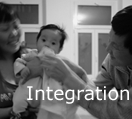Integration

Integration is currently one of the most discussed topics related to the presence of migrants in Europe. The debate under this issue tackles seemingly nonproblematic, however unclear and controversial questions. Who do we want to integrate, and where to? How can we measure the level of integration, and how shall we discern between integrated and non-integrated immigrants? Who is considered to be desirable for integration from the point of view of the European nation-states? Do some of the foreigners have better prerequisites for integration as many political concepts suggest? Is even the entire idea of the so-called integrated society compatible with the current conditions of the global capitalism and its requests for flexibility and mobility?
The texts in the Integration Theme deal with the experience of integration and the development of integration policy in different countries. They present both expert views on integration and the personal experiences of immigrants.
The section was created under the project Quality
integration through quality information.